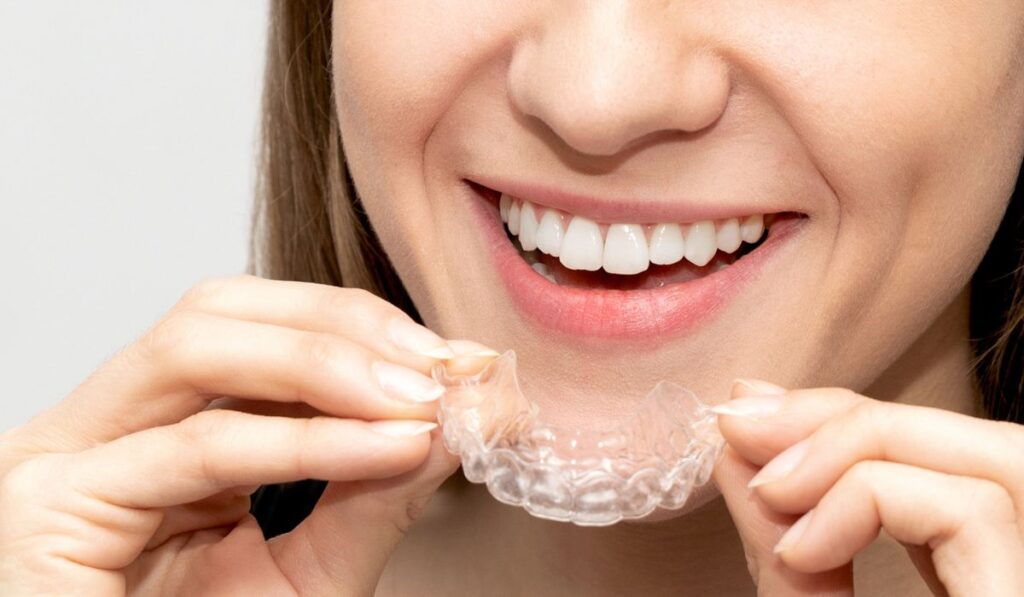Braces and Invisalign are popular solutions among people who want to fix minor misalignment or gaps in their teeth. While they have been proven effective, some worry about the potential of experiencing temporomandibular joint (TMJ) dysfunction symptoms. This dysfunction results in issues like compromised jaw joint movement and pain in the surrounding muscles. But can braces really cause TMJ problems?
The main cause of TMJ disorders is difficult to determine, but it often stems from a combination of issues like arthritis and jaw injury, not braces. Other causes include bite issues, genetics, and bad habits like teeth grinding. In general, braces or Invisalign aren’t a threat to your oral health.
If you’re concerned about TMJ dysfunction, it’s important to know that in most cases, the pain and discomfort it causes can be relieved through nonsurgical treatments like muscle relaxants, sedatives, pain relievers, and tricyclic antidepressants. Physical therapy, patient education, and bite guards can also help fix the problem. Let’s take a more detailed look at TMJ disorders and whether braces can contribute to them.
What is TMJ?

The temporomandibular joint functions as a sliding hinge that connects the jawbone to the skull. On each side of the jaw, you have one joint. If you have a TMJ disorder, you can experience pain in the joint or jaw and muscles that manage jaw movement. This can lead to lead to difficulty chewing, locking of the jaw, and other symptoms.
The main cause of TMJ disorders is difficult to pinpoint, as the pain can be caused by multiple factors. These include genetics, jaw injury, and arthritis. Some people suffering from jaw pain also tend to clench and grind their teeth.
In most cases, pain and discomfort from TMJ disorders is temporary and can be relieved with nonsurgical and self-managed treatments. Typically, surgery is used as a last resort after all conservative measures fail to offer relief.
To determine if you have a TMJ disorder, watch out for several symptoms. These include pain or tenderness of the jaw. You can also experience pain in both joints or only on one side.
The disorder can also manifest as aching pain around the ear. If you have difficulty chewing or experience pain when you chew, it could also be a case of a TMJ dysfunction. Locking of the joints, which makes it difficult to open and close the mouth, is also a common symptom.
Patients with TMJ disorders can also have a clicking sound and grating sensation when they open their mouth or chew. However, if there’s no pain and limitation of movement linked with the jaw clicking, you probably don’t need to worry about having problems with your TMJ.
What Causes TMJ Disorders?
So, what triggers TMJ disorder? There’s a combination of factors that can work together to cause it.
The biggest cause of TMJ disorders is trauma. You can view trauma as microtrauma or macrotrauma. Microtrauma includes internal causes like grinding of the teeth and jaw tightening. This leads to the continual hammering of your temporomandibular, which changes teeth alignment.
Muscle involvement can also cause inflammation of membranes around the joint. Clenching and teeth grinding are habits that can be diagnosed in people who experience pain in the temporomandibular joint and have facial pain.
On the other hand, macrotrauma, like a punch to your jaw, could break the jawbone or cause dislocation of your TMJ. Also, this kind of trauma can damage the cartilage disc on the joint. You can also experience pain in the jaw because of dental work that includes stretching open the joint for prolonged periods.
Another cause to keep an eye on is osteoarthritis. The jaw joint is also prone to changes caused by arthritis, as these changes often occur because of joint degeneration or wear and tear. This can lead to progressive loss of cartilage.
Rheumatoid arthritis can cause inflammation of the joints and could also affect the TMJ. When it progresses, the disease destroys cartilage, causes joint deformity, and erodes bones. Other problems that can cause TMJ disorder include bone deformity at birth, joint infection, and cancer.
Is TMJ Disorder Common After Wearing Braces?
One of the discussions about TMJ disorder covers concerns about braces, as some people believe wearing braces can trigger the disorder. Keep in mind that this is a multi-factorial condition, so there are many possible causes of the disorder.
Braces are designed to align misaligned bites and straighten teeth. Regardless of the braces you get, they will put strain on the muscles and joints of the jaw and mouth. This tension is required to align the teeth and correct deformities. However, this can create an imbalance between the upper and lower jaws, thereby irritating your temporomandibular joint.
If you have never experienced TMJ pain and suddenly experience symptoms after getting braces, you should see your orthodontist to know if your braces are causing problems. However, keep in mind that after getting braces or after readjustment, you will naturally experience some headaches or pain.
This is common among patients and should go away after a while. That said, these can also be symptoms of TMJ disorder. If the pain continues for longer than expected, you should see a professional to know if you’re experiencing TMJ issues.
You can discuss options with your orthodontist. The optimal choice could be simply readjusting the braces to reduce the pressure on the jaw. This can be done with all types of braces.
How Do You Get Rid of TMJ Disorder?
There are several non-invasive methods of treatment for TMJ disorder. Because it’s often caused by pressure on the joint, easing this pressure on your mandibular joint can allow smooth joint movement.
If you have braces, they could be exerting too much pressure on the jawbone, so a readjustment may be necessary to avert further complications.
In fact, one of the recommended treatments for relieving TMJ pain is to wear braces. Because TMJ is mostly caused by problems with the bite, correcting the bite will effectively relieve the pressure and pain of TMJ. Teeth alignment can help the situation if you’re experiencing discomfort and pain in your jaw or joint.
Teeth grinding is among the problems that can be solved by braces, as the braces are designed to help the teeth sit in alignment. Even patients with relatively good alignment can benefit from braces if they’re experiencing issues related to their TMJ.
Can Invisalign Cause TMJ Disorders?

Some people wonder if Invisalign can cause TMJ, and the answer is that this is not very likely. Scientific research shows no direct link between Invisalign and TMJ issues.
Most problems with TMJ can be present in both good and bad bites (but mostly bad). Because Invisalign can alter a patient’s bite, it could worsen TMJ in theory, but this is highly unlikely.
If you’re a patient suffering from TMJ, you should discuss the issue with your orthodontist to find out if you should stop Invisalign treatment and determine the cause of your symptoms.
While Invisalign may not be the source of the problem, it might have triggered a separate issue the orthodontist wasn’t aware of before beginning the Invisalign treatment.
Note that orthodontists are advised against offering Invisalign treatments if a patient displays symptoms of TMJ disorder. The symptoms of TMJ dysfunctions include ear pain, headaches, popping of the jaws, difficulty focusing, depression, and chronic fatigue.
Until these are treated and you’ve confirmed that it’s safe to apply Invisalign aligners, the Invisalign treatment should be stopped.
Conclusion
To fix crooked teeth and enjoy your best smile, you should discuss with an orthodontist your options for getting Invisalign or braces. Many general dentists are also professionally trained in Invisalign services, so you might not even need to visit a specialist.
While many people associate these with causing TMJ disorder, in most cases, the TMJ pain comes from other underlying problems like arthritis. If you have discomfort in the jaw or joints, you should pause getting braces or Invisalign until it’s confirmed it’s safe to get the treatment.


